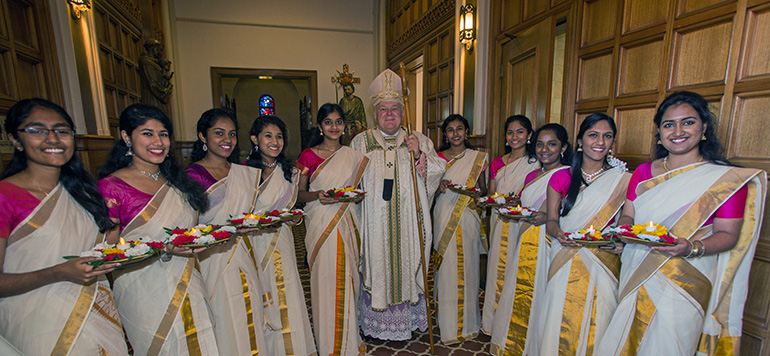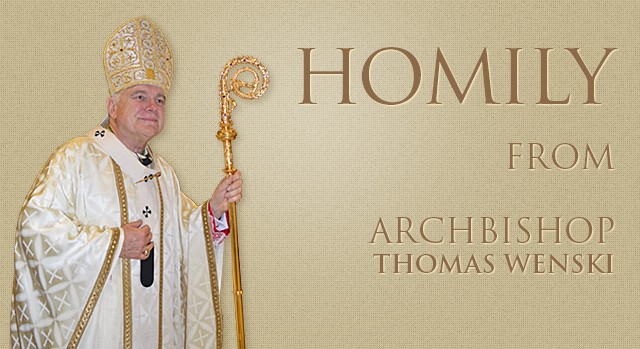By Archbishop Thomas Wenski - The Archdiocese of Miami

Photographer: MARLENE QUARONI | FC
Members of the Indian Catholic Syro-Malabar community, dressed in traditional costumes, surround Archbishop Thomas Wenski before the start of the annual Migration Mass.
Archbishop Thomas Wenski preached this homily at the annual Migration Mass, celebrated at St. Mary Cathedral Jan. 7, 2018, feast of the Epiphany. The Mass marks the start of the annual observance of National Migration Week, Jan. 7-13. The theme of this year’s National Migration Week is “Many journeys, one family.”
“Lord, every nation on earth will adore you.” Epiphany � which means “manifestation” or revelation � celebrates the fact that when Jesus was born as a man in Bethlehem he came not for just one people but for all peoples, all races, of all times and places. For almost 50 years, the Catholic Church in the U.S. has associated the Solemnity of the Epiphany of the Lord with National Migration Week. so as to call attention to the dramatic realities of human mobility in our times.
Today, at this annual Migration Mass, people from the many nations that make up this local Church here in South Florida come to adore our Lord, who comes as a light for the world, the light for the nations. In representing the various ethnic ministries of the Archdiocese, all of you well embody the theme of this year’s National Migration Week: “Many journeys, one family.”
May the Star of Bethlehem which guided the Magi on their journey and sustained their hope be always the point of reference to help all peoples find their way to Christ.
The United States, whose national motto is “e pluribus Unum” (out of many, one), is proudly a nation of immigrants. In America, our Catholic Church from its small beginnings, with the establishment of the first diocese in Baltimore a little more than two centuries ago, has grown tremendously because of the influx of successive waves of immigrants. This diversity � far from dividing � has enriched us tremendously � both as a nation as well as a community of believers.
Despite a constant, if somewhat muted, anti-Catholic prejudice that has always been part of the American experience, the Catholic Church in America � through its vast network of social services and schools � has helped immigrants integrate successfully into American society. Our schools not only taught the catechism, they also taught patriotism. Our forefathers came here from countries torn apart by war and poverty � they came seeking “hope” and “justice”; and for the most part the “American dream” did not defraud them. And today, in our Archdiocese, our Catholic Legal Services help more than 3,000 clients every month in three different locations as they seek today hope, justice and a chance to pursue the “American dream.”
Of course, in the last 50 years, the numbers of new immigrants to America has equaled, if not surpassed, those of the “Great Wave” of the late 19th and early 20th centuries. Human mobility continues to increase in this new era of globalization � and while war and poverty continue to displace people, work or the promise of work is a major factor that leads people to migrate from one country to another. In the U.S. and other countries, where the governments were slow to respond to the market’s need for more labor, irregular or what some call “illegal” migration grew to fill the need.
Migration is fiercely debated today. Too often the debates we hear on TV or radio generate much heat but little light. And frankly, Americans are divided and conflicted about immigration: We see efforts to pass increasingly restrictive legislation; we see the numbers of refugee admissions drastically curtailed in the midst of a worldwide crisis not seen since the end of World War II; we see draconian � and expensive � proposals to build higher walls and bigger detention centers; yet, we also see efforts, necessary efforts, to provide relief to those living in the U.S. without the benefit of a permanent status � like the 800,000 DACA recipients, or the beneficiaries of TPS from Haiti and Central America.
And this month, expect the debates to intensify. Let us pray for our political leaders that they will listen to their better angels � and not just their fears � and pass legislation that serves the common good of all.
The Church teaches us not to fear the migrant � and the Church warns us not to mistreat the migrant. In a way, just as we call Jesus the King of Kings and the Lord of Lords, we can refer to him as the Migrant of Migrants as well. In becoming a man like us, he “migrated” from heaven. He became a citizen of our world so that we in turn might become citizens of the world to come. And those who will enter into his heavenly homeland will do so because, as he himself will tell us: “I was a stranger, and you welcomed me”.
This is why the Church will continue to speak out on behalf of migrants everywhere. We speak out in defense of those, especially the young, who are trafficked across borders to be exploited in the sex trade. We will continue to advocate for a just and equitable reform of a broken immigration system that continues to separate families for unacceptable periods of time and that provides no path to citizenship for millions who work in jobs that otherwise would have gone unfilled. We will defend the rights of refugees and asylum seekers for a safe haven from persecution and violence.
In a world of broken promises and fragile hopes, may our Church, in her wonderful diversity of cultures and languages, be always a beacon of hope, a light to the world. By modeling what a reconciled world could look like, we can � with the help of God’s grace � show those whom globalization has made neighbors how to live as brothers and sisters.


Comments from readers